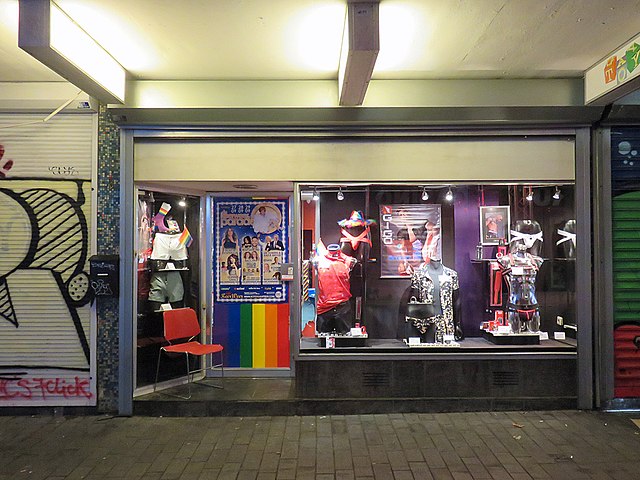Top Qs
Timeline
Chat
Perspective
Gay-friendly
Promoting a respectful environment for LGBTQ people From Wikipedia, the free encyclopedia
Remove ads
Gay-friendly or LGBTQ-friendly places, policies, people, or institutions are those that are open and welcoming to gay or LGBTQ people. They typically aim to create an environment that is supportive, respectful, and non-judgmental towards the LGBTQ community. The term "gay-friendly" originated in the late 20th century in North America, as a byproduct of a gradual implementation of gay rights, greater acceptance of LGBTQ people in society, and the recognition of LGBTQ people as a distinct consumer group for businesses.
Remove ads
Businesses

Many businesses now identify as gay-friendly, allowing for a more diversified employee and customer base. The Human Rights Campaign works to achieve equality for gays, lesbians, and other marginalized minorities, and publishes a list of companies in relation to issues concerning LGBT people. Companies that are noted for gay-friendly work environments include Dell and Coca-Cola. Companies such as R Family Vacations, Manspray, Volkswagen, Ginch Gonch, and numerous others offer niche products and services for gay customers. Others, such as LOT Polish Airlines sends the message of gay-friendliness by offering travel to major gay destinations with a rainbow flag.[1] Studies have shown that LGBT communities tend to favor gay-friendly businesses, even if the cost of a particular product or service is higher.[2]
Remove ads
Religious groups

Some Christian and Jewish religious denominations, as well as Christian churches and affirming Jewish synagogues, have LGBT-friendly programs. [3]
World
Summarize
Perspective
The Pew Research Center conducted a survey in 2019 to measure levels of acceptance of LGBTQ people around the globe.[4]
Researchers at the Williams Institute at UCLA released a report in 2021 after analyzing findings from different surveys to develop their own LGBTQ Global Acceptance Index (GAI).[5]
The Spartacus International Gay Guide publishes the Gay Travel Index, a ranking of gay-friendly countries. Points are added to countries for anti-discrimination legislation, equal marriage, partnership and adoption laws, and LGBT marketing. Meanwhile, points are subtracted for anti-LGBT laws, HIV travel restrictions, religious influence; and prosecution, murders, and death sentences.
In 2024, the Spartacus Gay Travel Index featured a majority of Western European countries in the top 12 spots (Denmark, Germany, Iceland, Malta, Norway, Portugal, Spain and Switzerland), rounded out by Australia, Canada, New Zealand and Uruguay. The bottom 4 places went to Afghanistan, Chechnya, Iran and Saudi Arabia.[6]
Not Included in Data
Remove ads
United States
Summarize
Perspective
Spartacus also publishes a Gay Travel Index for US states, listing the 50 states plus the District of Columbia with the same criteria as the country rankings. In 2024, the top spot went to New York while the bottom ten states were mainly the southern and the mountain states, with Oklahoma being the overall worst-ranked state for LGBT people.[6]
Notes
- In Germany, due to federal government system, there are varying regulations regarding arrival/residence HIV. For example, in Bavaria someone who is HIV-positive can be denied entry. The Federal Constitutional Court has stipulated in several renditions of judgment that the politicians implement the same rights for gay men and lesbians which apply to heterosexuals.
- The Employment Equality Act allows religious-run workplaces exemption from its anti-discrimination provisions to protect their ethos.
- In Northern Ireland the legal situation for same-sex adoption is unclear.
- In Israel a civil marriage for both homosexual and heterosexual couples is not possible as marriage can only be performed by a Rabbi. This problem does not only apply to gays and lesbians but also heterosexuals belonging to different religious affiliations. There are limited anti-discrimination laws (exception: certain religious groups).
- The United States Virgin Islands have the same legal status as Puerto Rico regarding the USA. There is also a ban on hate crimes. After the Supreme Court decided in favor of same-sex marriage in the US, there are plans to implement same-sex marriage in Puerto Rico as well.
- Bosnia and Herzegovina passed an unclear anti-discrimination law in 2009 in which a ban on discrimination against "sexual expression" is mentioned. There is a reference that "sexual identity" is not meant in this case. It is obvious that an attempt to adhere to the minimum requirements from the EU has been made, to be accepted into the EU.
- As an overseas territory of the Netherlands Sint Maarten recognizes same-sex marriages which are performed in the Netherlands. In St. Maarten itself gay marriage is still not possible, but changes can soon follow. There are no adoption laws.
- In May 2016 the Parliament of Seychelles decided to make homosexuality legal.
- There are regional differences in the laws relating to homosexuals. In addition, the local religion is just as crucial, whether a law is implemented or not.
- There are reports of a different judicial interpretations of the law on "sex against nature".
- The Vatican City adheres to Italian law, but restrictions are possible if the ecclesiastical law contradicts Italian law. Therefore, there are conflicting opinions that homosexuality is not illegal or just not happily seen, but tolerated.
- Police stopped violently the Gay Pride on 29th June, 2015. This can be considered a de facto ban on the Pride.
- Homosexuality in Iraq is formally legal, but police and military track down homosexuals, and reports of murder and rape exist.
- In 2015 Florida explicitly lifted the adoption ban for homosexuals after federal judges ruled it unconstitutional in 2010.
Remove ads
See also
References
External links
Wikiwand - on
Seamless Wikipedia browsing. On steroids.
Remove ads